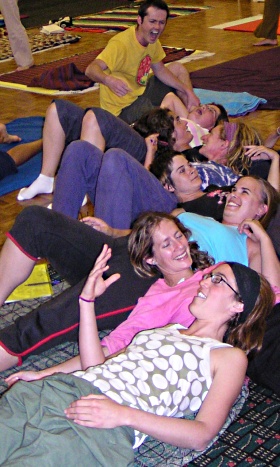We are sad to note Rae’s passing and acknowledge her wonderful contribution to the Feldenkrais Community. We are leaving this article online as a tribute to her and her work.
For decades, two practices have been central to Rae Martin’s life: one is being in the water and the other is the Feldenkrais Method. It’s because of these that Rae enjoys a career filled with creativity and satisfaction. But beyond that, Rae credits both practices with saving her life.
Rae lived at Margaret River, and for five years never missed her morning ocean swim.
Before that, Rae spent a year living in Buenos Aires, but was rushed home following a grim diagnosis of stage four metastatic cancer. “I really wasn’t very long for this planet. I returned from Argentina very unwell. By the time I came home I was 40kg, couldn’t eat and had major surgery. I decided at that point, in that whole whirlwind of it, that I needed time to think. So I kind of escaped and went away and had some time out of it all,” Rae says.
“For me, the thinking strategies that we learn in this Method are life-saving. I can look at something and say, ‘Is that really true for me?’.”
Rae discovered that for her, quality of life was more important than prolonging life with medical treatment, and she is grateful that her family – including her husband, children, parents and siblings – totally supported this decision. An essential ingredient in that quality of life was Rae’s daily ocean swim. “I just knew I needed it. I came home from Buenos Aires and realised that cities weren’t for me: I needed absolutely to be in the country.
“Since then I have been getting into the ocean every single morning of my life. Even when it’s raining and hailing I’ll still go into the ocean.”
Rae started her working life in the water, as an instructor in her family’s swimming school. Drawn to working with people with disabilities, she decided to study physiotherapy and later made the natural progression to hydrotherapy.
But something else happened along the way: as a physio, Rae worked in neurosurgery.
“For me, the brain has always been the fascinating place to work with, and I think that’s what got me into the Feldenkrais Method from the word go: I knew that you were working with much more than just the body,” Rae says.
Rae had a successful physiotherapy practice at the University of Western Australia when she first attended a week-long Feldenkrais “phase” with trainer Frank Wildman. “During that week’s phase with Frank I remember a real paradigm shift, and I can remember it very clearly – I even remember where I was sitting at the time,” Rae says.
“That’s a very unstable place to be, because it’s like everything you’ve learned and believed gets thrown out the window. And I can remember feeling, knowing that I could never go back to believing what I had. I realised that this was a completely new direction.”
After an intense period of “relearning”, Rae completed her Feldenkrais training in Melbourne in 1991. Returning to Perth, she set up a Feldenkrais practice at home and sold her physiotherapy practice at UWA. Her swimming instruction continued right through it all. But increasingly over time, Rae has married Feldenkrais with working in the water.
Now Rae enjoys approaching her practice from infinite angles. For a start, she does the usual “dry-land” work of Feldenkrais – Awareness Through Movement (ATM) group lessons and one-on-one Functional Integration.
In the pool, Rae works with people who have sensory-motor problems and learning disabilities, as well as people recovering from orthopaedic surgery. Rae enables them to improve their function through what is essentially one-on-one ATM in the pool. “To me, the water lends itself to an enormous amount of creativity. And that’s what I see in the Method that is so brilliant, the creativity.
“And the heart of our Method is that it’s a learning Method. And that’s what is so different to a treatment method. It took me a long time really to see that; it’s the learning that comes out of the way we work that is so profound.”
Rae also uses the Feldenkrais Method as a basis for creating unorthodox but highly effective programs for people to learn to swim, and she regularly presents at state conferences for swimming instructors.
Common to all of her work is the belief that people learn better when they are allowed to make their own discoveries, and to that end, Rae even aims to scale down her use of hands-on in the water. “For me, the independence that people have is really important,” Rae says.
Even within her Feldenkrais practice, Rae enjoys the ability to take multiple approaches. “As a physio there were times I’d see something and I’d ring up another physio because I wasn’t sure and didn’t know how to approach something. I don’t have that with Feldenkrais – I always know with Feldenkrais that I can approach it with something. It’s given me an incredible box of tools to work with, far more tools than I would have ever imagined; and we can come in from so many levels because we’re dealing with the brain. I even include music now, all sorts of things that I think might tap into that person’s psyche somehow.
“The biggest thing I find with the water is the change in self-image and self-belief that you can get from somebody, and that’s what’s really motivating all of us.
“I remember hearing that quotation of Moshe – the two things that drive all of us are our self-image and our belief systems. I know that I’ve really played with both of those to a big extent or I wouldn’t be here.”


